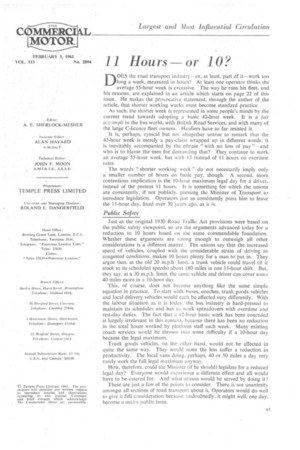11 Hours or 10?
Page 35

If you've noticed an error in this article please click here to report it so we can fix it.
DOES the road transport industry—or, at least, part of it—work too long a week, measured in hours? At least one operator thinks the average 55-hour week is excessive. The way he runs his fleet, and his reasons, are explained in an article which starts on page 22 of this issue. He makes the provocative statement, throbigh•the author of the article, that shorter working weeks must .become. standard practice.
As such, the shorter week is represented in some people's minds by the current trend towards adopting a basic 42-hour week, It is a fait accompli in the bus world, with British Road Services, and with many of the large C-licence fleet owners. Hauliers have so far resisted it.
It is, perhaps, cynical but not altogether untrue to remark that the 42-hour week is merely a pay-claim wrapped up in different words; it is inevitably accompanied by the phrase "With no loss of pay "—and who is to blame the men for demanding that? They; continue to work an average 55-hour week, but with 13 instead ,of 11 hours on overtime rates.
The words "shorter working week" do not necessarily imply only a •smaller number of hours on basic pay, though. A second, more contentious implication is the 10-hour maximum legal day for a driver, instead of the present 11 hours. It is something for which the unions are consistently, if not publicly, pressing the Minister, of .Transport, to introduce legislation. Operators just as consistently. press him to leave the 11-hour day, fixed over 30 years ago, as it is. '
































































































































